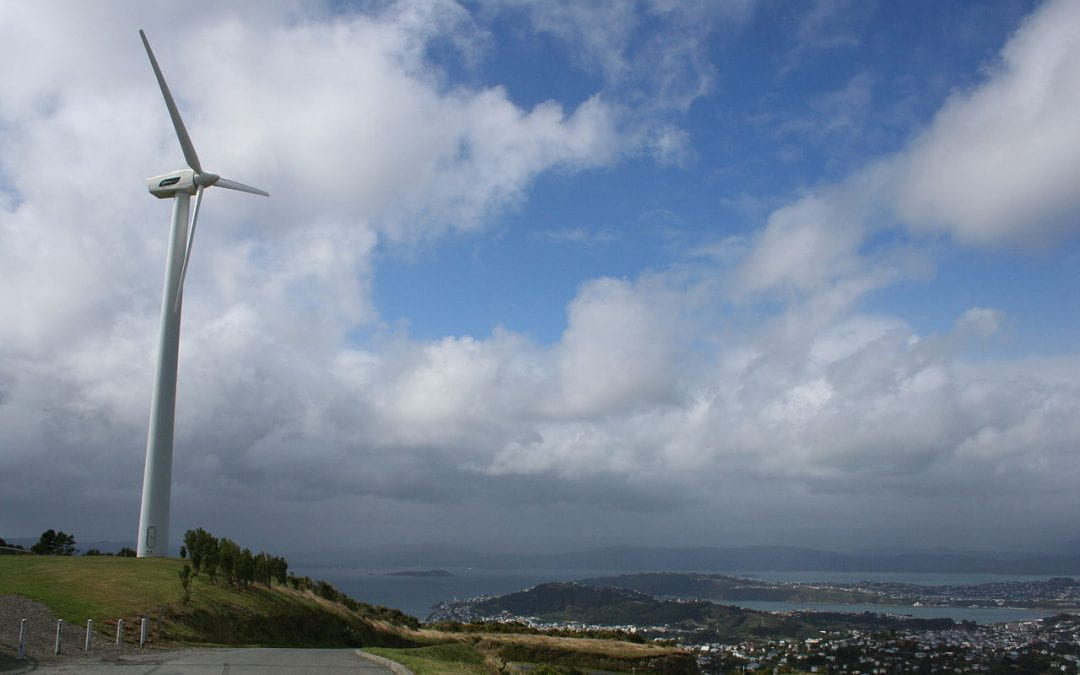New Zealand’s first wind turbine, built in Brooklyn, Wellington, in 1993.
Wikimedia
The Big Q is partnering with the University of Auckland’s Climate Systems Laboratory and Ngā Ara Whetū Centre for Climate, Biodiversity and Society. During this collaboration we’ll be tackling some of the big questions concerning the climate, biodiversity, and society from an Aotearoa New Zealand perspective. Below, Ngā Ara Whetū’s co-directors draw on their interdisciplinary expertise to answer “What should New Zealand do to commit fully to tackling climate change?”
By Maria Armoudian, Saeid Baroutian, Jacqueline Beggs, Niki Harré, Rod McNaughton, David Noone, JR Rowland, and Rachel Wolfgramm — co-directors of University of Auckland’s Ngā Ara Whetū Centre for Climate, Biodiversity and Society. Izzy Renton, Master’s student at University of Auckland, contributed to this article.
We need to invest in clean technologies and circular economies to build a sustainable, diversified economy. And that will also lessen our dependence on carbon-emitting industries, say leading Auckland academics.
Opinion: As world leaders meet to discuss climate change solutions and mitigation, the rate of ecosystem degradation is advancing at pace. Well-documented changes in temperature and patterns of rainfall are jeopardising vulnerable food systems and water security. Coastal erosion, rising sea levels and pollution are creating uninhabitable land leading to climate induced migration, identity loss and sovereignty issues. This requires building resilience and adaptive strategies to climate change realities for communities across the Pacific. This has led to more strident calls from politicians, religious and community leaders across the Pacific, for recognition and reparations for loss and damages to societies and economies.
In recognition of its well-established relationships across the Pacific, Aotearoa New Zealand has rightfully joined the call to aid the recovery and resilience of poorer nations that will bear the brunt of climate change. While its pledge of $20 million is important, particularly for its symbolism, it does not address the causes of climate change already wreaking havoc in poor and Indigenous communities across the globe. This is where New Zealand can and should be leading.
New Zealand’s electricity is already powered mainly through renewable energy. But it can do more to ensure a clean, renewable energy future, including energy efficiency and solar and wind power through investments and incentives. Our automobile-based transportation system, an economic system reliant on emissions-producing industries, and waste policies and practices need a profound makeover. New Zealand can lead with action, vision and with bold goals, demonstrating what climate leadership looks like.
A place to start is with the “cow in the room”. Building a sustainable, diversified economy will lessen New Zealand’s dependence on carbon-emitting industries, such as agriculture and international tourism. Accomplishing this requires investment in and incentivising clean technologies and circular economies that support communities and put kaitiakitanga into practice.
This is the aim of New Zealand’s CleanTech Mission, a new national initiative that aims to boost the country’s global success in ‘clean tech’ – technological innovations that are sustainable and benefit the climate, in which the University of Auckland’s UniServices is a partner. We have initiatives underway such as Mint Innovation’s state-of-the-art clean technology for recovery of precious metals from electronic waste. Similarly, Computer Recycling sorts and shreds hard-to-recycle electronic waste, such as flat panel screens, laptops, televisions, and mobile phones, recovering gold, silver, copper, platinum, and palladium. Biotelliga is developing safe and sustainable solutions to managing agricultural crop pests and diseases; Usedfully is co-designing the first textile product stewardship scheme in New Zealand to use waste textile through technology and research; Para Kore Marae provides te ao Māori worldview-based support and mentorship for marae, kōhanga reo, kura and community organisations; and Zero Waste Network connects, educates, enables and inspires community enterprises to emulate sustainable natural cycles.
A truly circular economy requires holistic and robust solutions and technologies without unintended consequences or allowing greenwashing claims…
To continue reading, head to Newsroom where you can find the original article.
The Big Q is working with Ngā Ara Whetū to bring you research and news on climate, biodiversity, and society from an Aotearoa, New Zealand perspective.
Disclaimer: The ideas expressed in this article reflect the author’s views and not necessarily the views of The Big Q.

